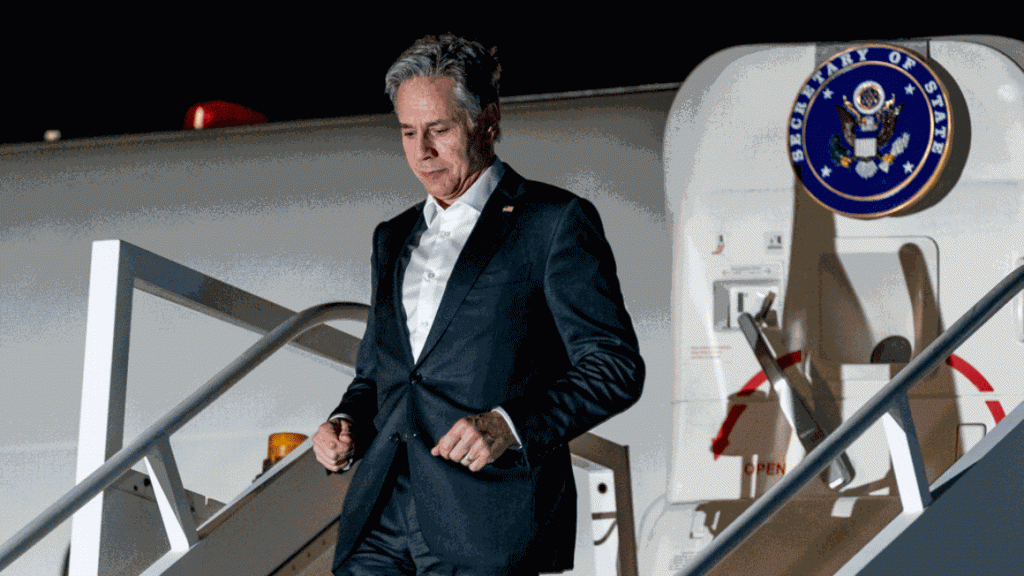Published: August 18,2022
By Staff writer

The visit by the US Secretary of State Anthony Blinken to three African countries namely; South Africa, Democratic Republic of Congo (DRC) and Rwanda, was less about cooperation, but more of US geopolitical interests of countering China and Russia influence in Africa.
Blinken who was in South Africa to launch the new U.S. Strategy for Sub-Saharan Africa, focusing on climate change, trade, health and food insecurity. Although these were the stated reasons for his visit, it is believed that the hidden agenda is a strategy to win support of African countries in the new cold war against Beijing and Moscow. During his remarks, Blinken criticized China for its ‘strong reaction to House speaker Nancy Pelosi’s visit to Taiwan.’ South African is a member of the BRICS countries, and its leaders have made it clear that their country cannot be patronized or bullied to accept certain positions taken by the west.
In a joint press conference, the South African Minister of International Relations Naledi Pandor stressed that, “from some of our partners in Europe and elsewhere, there has been a sense of patronizing bullying — ‘You choose this or else.’ And the recent legislation passed in the United States of America by the House of Representatives, we found a most unfortunate bill.”
Minister Naledi accused the west of bullying on Ukraine. She further clarified that South Africa has different views from the U.S. on Ukraine, China, and Israel and the Palestinians. Blinken who expected to woo South Africa from its close relationship with China and Russia, must have realized how US gets it wrong trying to undermine other countries all over the world for selfish geopolitical interests. The US and NATO are putting pressure on African countries to align with its policy on Ukraine. South Africa criticized the U.S. bill passed in April, “Countering Malign Russian Activities in Africa Act,” which has been seen as intended to punish African countries that have not toed the line on Ukraine.
The visit by the US Secretary of State comes after the Russian Foreign Minister Sergey Lavrov, last month visited African countries namely; Egypt, Congo, Uganda and Ethiopia. Blinken’s visit also happens at a time the US is planning to host the US-Africa Leaders’ Summit, in Washington scheduled for December 13-15. This shows the extent at which the US is trying tocourt African countries and edge out its perceived enemies and competitors. In Africa, the US administration is un comfortable with China’s Belt and Road Initiative, which has improved the much needed infrastructure development, with false claims that China is submerging the African continent into a debt burden.
While in RDC and Rwanda, Blinken said that the US is concerned with the security situation in DRC where M23 rebels have been fighting with government forces. Rwanda criticized the US stance of claiming that Rwanda was supporting M23 rebels, while on another side they do not condemn the DRC government for incorporating the FDLR terror group, which are the remnants of former government soldiers (EX-FAR) and Interahamwe militia who committed genocide against the Tutsi in Rwanda. Blinken was reminded that Rwanda supports the AU and regional mechanisms under the Nairobi process and CGRL initiatives to address the security problem in Eastern DRC.
The main agenda for Blinken in Rwanda though, seemed not to be about the strained relationship with the DRC, because the US has never had any role to play. Top on his agenda was to advocate for the release of “hotel Rwanda hero,” Paul Rusesabagina,whom the US refers to as, “a lawful permanent resident of US under wrongful detention” in Rwanda. Rusesabagina is a Rwandan who was sentenced to 25 years in prison with 20 others on acts of terrorism that killed 9 people and injured many others. Although survivors of Rusesabagina’s National Liberation Front (FLN) attacks wrote a letter to Blinken requesting a meeting with him on his visit to Rwanda, he declined to meet them under the pretext that his time was limited. Many Rwandans were angered by such a lame excuse, as Blinken had time to advocate for Rusesabagina’s release, and also met with Rwandan civil society.
On his tour, the U.S. Secretary of State, AnthonyBlinken, said that President Joe Biden’s administration sees Africa’s 54 nations as “equal partners” in tackling global problems, a statement that was seen as a blatant lie in the usual western hypocrisy when dealing with Africa. Although Blinken announced that the U.S. Strategy for Sub-Saharan Africa, focuses on climate change, trade, health and food insecurity, in practice the COVID-19 experience showed African countries who their true friends are. For example, although the US provided assistance to African countries in the fight against the COVID19 pandemic, the assistance came rather late, especially the critically needed vaccines. The US and other western countries were stocking more than they needed when African countries were in dire need. China and Russia shared their vaccines with African countries even before their own citizens were fully vaccinated.
Apart from RDC which has problems of dysfunctional governance, Blinken’s visit to South Africa and Rwanda exposed US’s arrogant and misguided foreign policy, and one can confidently say that the visit exposed US failed foreign policy because the objectives of the trip were not realized.
For comments or opinion write to us on info@africachinareview.com. You can also follow us on twitter @africachinarev
 Africa -China Review Africa -China Cooperation and Transformation
Africa -China Review Africa -China Cooperation and Transformation
